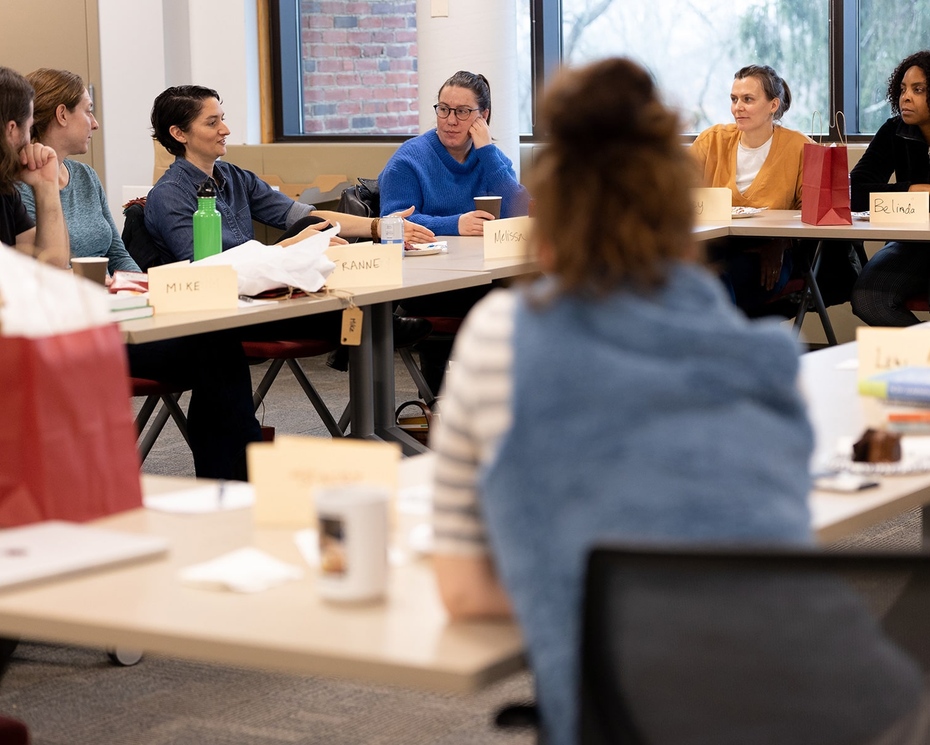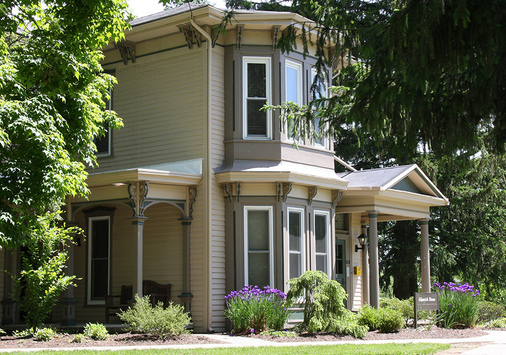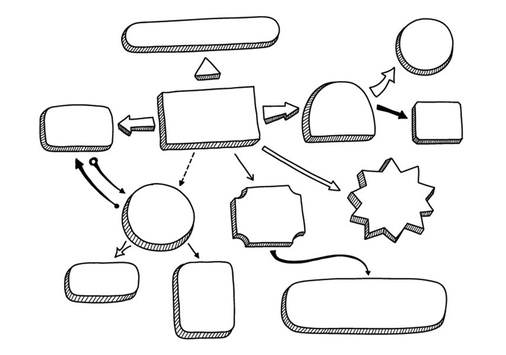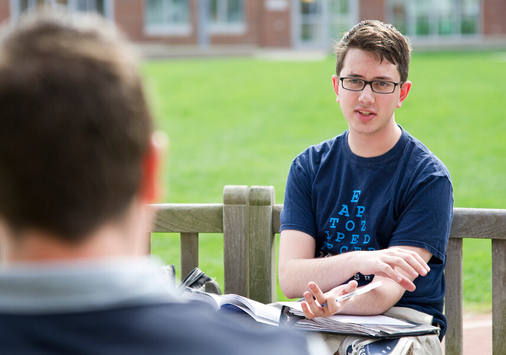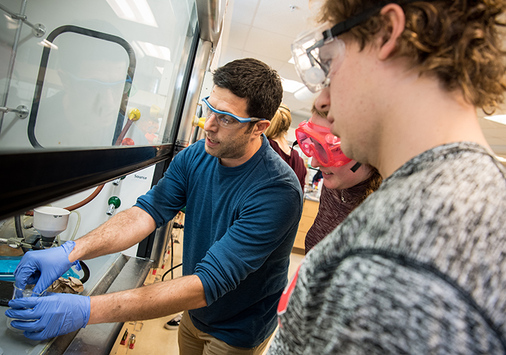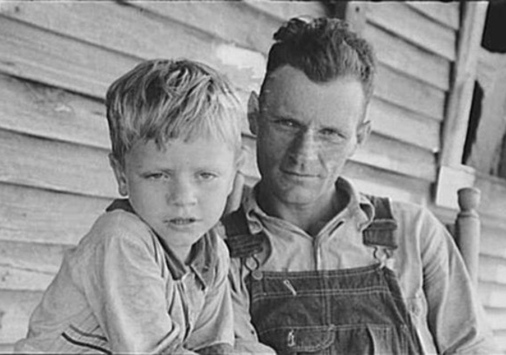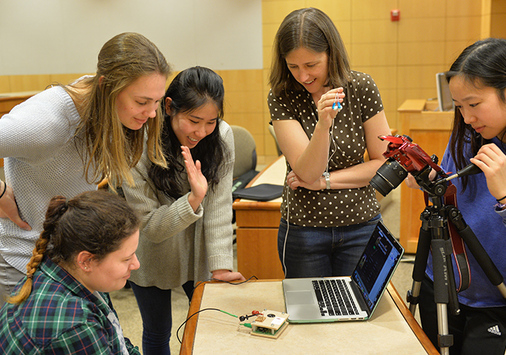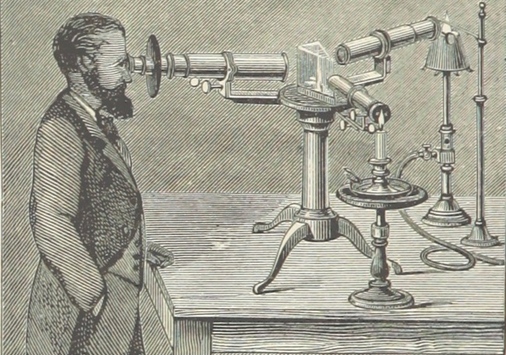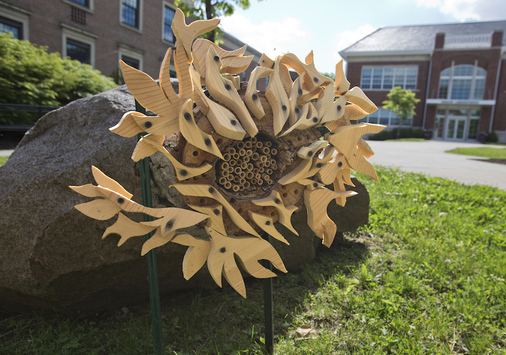February has been a great month for learning and teaching at Denison. Teaching Matters! coordinated Open Doors, where nearly seventy classes (!) were opened for friendly visitors. And the Reflective Happy Hour that capped off the week provided a great opportunity to affirm the learning happening all across campus (and the drinks were pretty good, too).
As part of sustaining that spirit of affirmation and celebration, we used this month’s Director’s Cut to reflect on ways teaching has shaped us: Our views on learning, teaching, and the power of relationships are intertwined with people who inspired us to think differently about who we might be. Curious? Read more.
Jeff: We’ve spent most of the year together talking about learning and teaching, obviously. And yet I’m struck by this: Have we ever discussed what really matters to each us about teaching? What, for you, stands out as core when you think about learning and teaching? What things made a difference?
Lauren: Unlike some, I am hard pressed sometimes to recall specific takeaways from a number of my undergrad courses. I didn’t put the pieces together across the arc of a semester or across disciplines [not a judgment of my professors, it’s more descriptive of who I was at 18-21]. What made a difference for my own learning was leaving the classrooms and seminar rooms and/or getting off-campus. Those experiences—the actual “doing”—were more transformative and reframed my perspective on issues we had been reading or discussing. I connected more with teachers who created time and space for those experiences as part of their courses.
Jeff: I appreciate your emphasis on the “actual doing” and what it can mean to leave the classroom and to open oneself to the learning that may follow.
One of my most formative college courses was a psychology class, Group Dynamics, taught by Steve Kramer. As part of the course we took an eight-day packing trip in the High Peak Region of the Adirondacks before the semester got underway. That trip was both laboratory (what we experienced served as fodder for numerous class sessions during the semester) and life-line, in the sense that I was different after rambling around in the wilderness, slogging through rain, and mastering that most necessary of arts: hanging food in trees to ward off bears! Wilderness came to matter to me in a way it hadn’t before, and there’s no question: Spending 24/7 in the woods brings people together!
I’m struck, Lauren, by the ways leaving classrooms, seminar rooms, and more generally getting off campus was so crucial for you. How did these “itinerant experiences” help you feel a sense of belonging in your education? That is, if I’m understanding what mattered about your experiences, you came to know yourself better through doing and venturing out and beyond. How can that focus promote a sense of belonging for students?
Lauren: Getting out of the formal learning space gave me the chance to see my professors in different and very special ways. My environmental geology professor, Carol Ekstrom, took us on field lessons throughout the Memphis region to investigate environmental processes and issues literally in our backyard. I loved seeing her in her own natural habitat - and it was clear that her enthusiasm was fueled by our own inquiry. After those trips, we’d return to the seminar room energized and more cohesive. I was a non-science major, but the culminating group project [developing a campus landscaping proposal utilizing native plants and creating a test plot] is still one of the most memorable. I definitely felt more connected with those particular classmates and to Dr. Ekstrom because of our shared offsite experiences throughout the semester.
Jeff: I love your line about seeing faculty in their “natural habitats.” We recently celebrated Open Doors and I know, for me, it was such a privilege to see colleagues doing what they loved. I was struck, for example, by the ways our faculty genuinely care about students as people and they also care profoundly for their learning. In the classes I sat in on, I had the chance to see how teachers challenged students to think hard about hard concepts, to engage seriously with the tenets of their disciplines, and to make connections between and among ideas in ways that honored the best of the liberal arts. The energy and enthusiasm were palatable. What, for you, was a big takeaway from Open Doors? And what do you hope our students might realize about our faculty colleagues?
Lauren: I purposely visited four classes (communication, biology, theatre, and political science) that were completely different from my chosen disciplines in undergrad/grad. I loved the feeling of zero pressure to take notes and simply follow along the class conversation (you can imagine how my Type A-ness still had to fight against that). The big takeaway for me was that you can parachute into a single class here at Denison and see the learning process unfold in ways that feel alive and meaningful — that was really fun to watch. It may not happen in the moment, but I hope that students gain the awareness of seeing their professors, coaches, and advisors as multidimensional people who take their professional work very seriously, week to week and year after year.
Same questions to you.
Jeff: For me, the biggest takeaway was that learning and teaching doesn’t happen in a vacuum. We’re all in this together. This shared commitment was crystalized across the four classes I saw. (Three were part of a wonderful deep dive into Biology, learning things I should have learned in undergrad!) Another takeaway was the confirmation that our colleagues genuinely see students as people eager and willing to learn (to steal wisdom May dropped; see her great 31 Questions interview in our February newsletter).
So we’ve said quite a bit to this point and I’ve had fun learning from you. As a way to bring this to an end, what’s one of the most surprising things you have come to realize about teaching, and can we each offer a shout-out to one teacher who made a difference to us?
Lauren: Maybe not surprising to anyone: Relationships matter, and those relationships are an essential part of the learning environment. While I may not remember a lecture, the assigned readings, or even some of the specific content in courses, I absolutely remember—even now—how the teacher or professor made me feel. And to my high school math tutor, Kelley Rouze, who I spent loads of time with me after I failed AP Calculus: Thank you for helping me learn how to rebound from failure. You cared about me not only as a student, but as a human. I haven’t forgotten that!
Jeff: Like you, I was lucky to have teachers who helped me see something in me that pulled me closer to my best self. My shout-out would go to my 7th grade Social Studies teacher, Joe Sudnak. He was also my basketball coach. From him, I learned I could be an athlete and love history, that I could speak up for ideas I cared about and have fun learning. I didn’t have to let my dribbling do all the talking (Nan, don’t roll your eyes. Relive the memories beginning at 12:45.) He died too young, but I am struck by how what I love—ideas, sports, and, thanks to him, the occasional neck-tie (he taught me how to tie one)— gesture back to what he really cared about: Making a difference in students’ lives.
Who’s a teacher you remember fondly? What might you say to him or her if you had the chance? What kind of “love letter” or “shout out” might you send? We’d love to hear from you.
